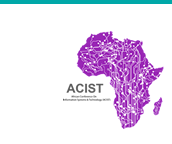10th African Conference on Information Systems & Technology (ACIST) 2024
12th - 13th September 2024
Local Organizer: Women’s University in Africa, Harare, Zimbabwe
The aim of ACIST is to provide a forum for researchers, practitioners and educators to present and discuss the most recent innovations, trends, experiences and concerns in all kinds of technology. Discussions cover information and communication technology (ICT) and allied areas such as electrical and electronic engineering, computer science, computer engineering, and information systems.
The 2024 (10th) edition of ACIST will invite scholars to share ideas, based on research from many different theoretical, philosophical, policy and practical perspectives.
Completed papers, research-in-progress papers, posters, position papers, panel discussion topics, and exhibition posters will be invited for submission. Submissions will be subjected to double-blind reviews. Accepted full papers will be published in the conference proceedings with ISSN 2467-8988.
In this 10th edition of ACIST, we are inviting scholars and practitioners to share ideas, based on research, about Human Centredness in African Digital Futures from many different theoretical, philosophical, policy and practical perspectives.
We invite you to participate in ACIST 2024 by submitting completed papers, research-in-progress papers or posters, position papers, panel discussion topics, and exhibition posters on topics which include, but are not limited to, the following:
- Digital Innovation
- Artificial intelligence technologies
- Sustainable (Green) ICTs
- ICT and Organisational Structuring
- Smart Devices and Mobile Ecosystems
- Smart Networks and Collaborations
- Information Systems Strategy
- Digital Society, Knowledge and Identity
- ICT Curriculum and Education
- Philosophy & Methods in IS Research
- ICT and Social Inclusion/Exclusion
- Digital Platforms and Smartness
- Ubiquitous and Pervasive Computing
- Big Data and Business Intelligence
- Cloud and Smart Computing
- Smart Cities & Wireless Communications
- Smart Collaborations & Crowdsourcing
- Digital Transformation
- Information and Computer Security
- Decision Support Systems
- Human Behaviour and ICT
- ICT-Enabled Services
Paper submissions will be subjected to double-blind reviews by at least two Programme Committee members. Accepted papers will be published in the conference proceedings with ISSN 2467-8988; and will be considered for further review and publication in the African Journal of Information Systems.
Timeline
- 14th May 2024 - Call for Submissions
- 5th July 2024 - Deadline for Submission of Full Papers, Research-in-Progress Posters, Panel Discussion Topics, Exhibition Requests
- 12th Aug 2024 - Notification of acceptance or rejection of Full Papers, Research-in-Progress Posters, Panel Discussion Topics, Exhibition Request
- 26th Aug 2024 - Deadline for submission of Camera-ready Papers



